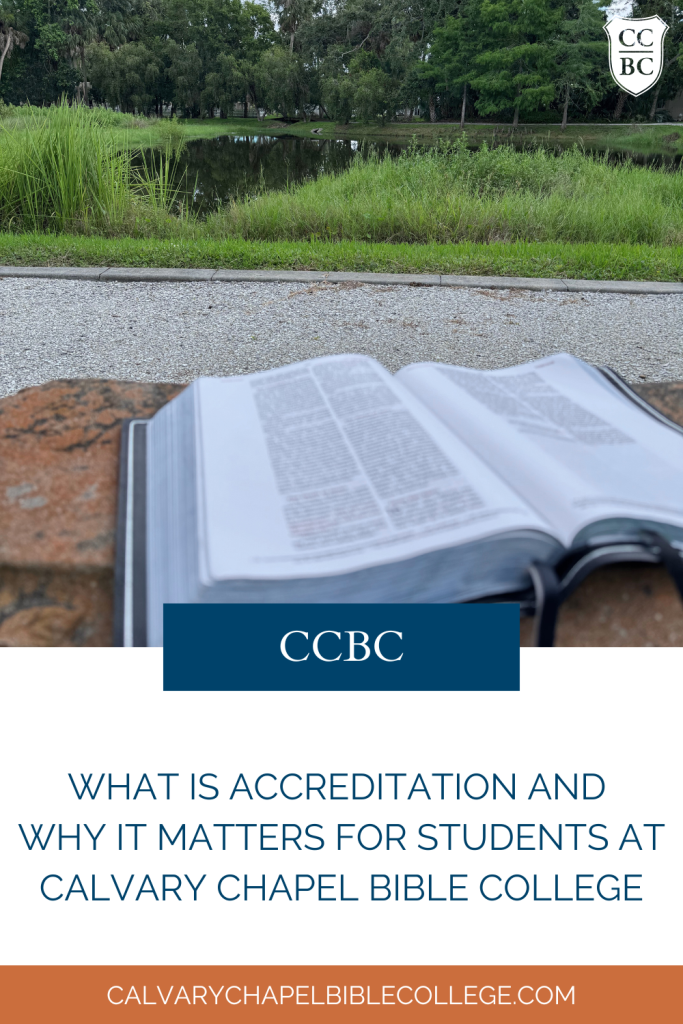
Not all Bible college degrees are created equal. Parents, pastors, and prospective students are asking an important question: Will this degree count? Will it transfer? Will this degree be recognized by seminaries, missions organizations, employers, or future ministries?
Those questions are exactly why Calvary Chapel Bible College is pursuing accreditation through the Association for Biblical Higher Education (ABHE).
What is Accreditation?
Accreditation is not just a box to check. It is a way of ensuring that students receive a quality education, that credits are transferable, and that the institution is built for long-term stability and trust.
To become accredited, a college has to demonstrate to external evaluators that it is substantially achieving its mission and conducting its affairs in a trustworthy manner.
In other words, accreditation involves showing that the college is doing what it claims to be doing, so that students, parents, financial supporters, and churches/pastors have a reasonable basis for confidence as they invest their time and money.
Accreditation is about quality assurance, but it is also about quality improvement. By pursuing and maintaining accreditation, colleges participate in ongoing evaluation and learning processes that can help the institution improve the quality of its service for the people who benefit from its work and care about its mission.
Pursuing accreditation is just one way we make sure our graduates are “Established in Christ, confident in the Scriptures, and empowered for witness.”
What Is ABHE?
The Association for Biblical Higher Education (ABHE) is a national accrediting agency recognized by the U.S. Department of Education and CHEA (Council for Higher Education Accreditation). It exists specifically for institutions whose mission is centered on biblical, theological, and ministry training.
• Focuses on schools where the Bible is central to the educational mission
Just as ABHE exists to help schools remain faithful to the Scriptures, CCBC holds the same core conviction. We Search the Scriptures, the Bible is not one department among many, but the heart of our curriculum. That alignment matters.
Why CCBC Chose ABHE
Accreditation is not “one size fits all.” There are different types of accreditors, and each one reflects a different educational philosophy. Calvary Chapel Bible College chose ABHE for three key reasons:
1. Mission Alignment
ABHE evaluates schools as ministry institutions, not as secular colleges that happen to teach the Bible. It affirms the authority of Scripture and the spiritual mission of Christian higher education.
2. Academic Credibility Without Mission Drift
ABHE maintains rigorous standards in academics, governance, financial stewardship, assessment, and student learning, but without pressuring schools to abandon their theological identity.
3. ABHE Is More Than an Accreditor, It Is a Partner in Flourishing
ABHE provides support services, peer networks, training, leadership development, institutional consulting, and shared wisdom across Bible colleges nationwide. It exists not only to evaluate schools but to strengthen them.
This fits our value: We Grow Together. CCBC does not pursue accreditation alone; we are part of a larger family of Bible-centered schools committed to helping one another flourish.
Where CCBC Stands Today: ABHE Candidate Status
Calvary Chapel Bible College was granted official ABHE Candidate Status in 2024.
Candidate status is not a “pre-application.” It is a verified level of standing that is only granted after a school has made significant progress toward meeting ABHE’s full accreditation standards. In other words, ABHE has already confirmed that CCBC is on a credible path toward accreditation and has demonstrated readiness in areas such as academics, faculty qualifications, governance, finances, and mission integrity.
Because candidate status is formally recognized, other institutions already view it favorably. As a result, CCBC students have been able to transfer credits and continue their education at other accredited colleges, universities, and seminaries.
You can verify CCBC’s candidate status anytime through ABHE’s public directory.
Our Next Step: Petitioning for Accelerated Accreditation
CCBC has submitted a formal petition requesting consideration for an accelerated path to full accreditation. This process is available to institutions that demonstrate significant readiness in their academic systems, faculty strength, student learning outcomes, governance, and financial stability.
Submitting the petition reflects our commitment to excellence and our confidence in the maturity of our institution. Final approval depends on ABHE’s formal review.
We are seeking this next step with prayer for God’s favor, trusting Him to lead and provide as He has from the beginning.
How ABHE Accreditation Benefits Students
Students don’t pursue accreditation; institutions do. But students are the ones who benefit from it most. Here are some common questions students ask when deciding on degree programs and accreditation.
Will my credits transfer?
Accredited colleges participate in recognized transfer networks.
Can I go to seminary or graduate school?
Most seminaries accept ABHE-accredited bachelor’s degrees.
Is this degree respected?
ABHE is a government-recognized accreditor.
What if I am not planning to pursue further education?
Accreditation guarantees that the education you receive meets nationally recognized standards of quality and rigor, serving you well in life and ministry even if you never transfer or seek another degree.
Will this affect financial aid in the future?
Accreditation is the foundation for federal aid eligibility.
Accreditation strengthens the way we Answer the Call, ensuring that our graduates are not limited by paperwork in the future, but equipped for ministry wherever God leads.
Frequently Asked Questions
Is ABHE a “real” accreditation?
Yes. It is recognized by the U.S. Department of Education and CHEA.
Is CCBC already accredited?
CCBC currently holds Candidate Status, an official pre-accredited category granted after meeting foundational standards.
Will my degree be accredited if I graduate before full accreditation?
Students who graduate during candidacy are often able to benefit once full accreditation is achieved, because many institutions and agencies recognize degrees earned during that period.
Why not choose regional accreditation?
Regional accreditors are designed for broad, secular academic institutions. ABHE exists specifically for Bible-centered schools like Calvary Chapel Bible College.
Does accreditation change CCBC’s theology or distinctives?
No. ABHE affirms, rather than erases, an institution’s biblical mission.
Does this apply to online students too?
Yes. Accreditation applies to both on-campus and online programs.
Accreditation and CCBC’s Mission
Accreditation does not change who we are; it strengthens our ability to fulfill our mission.
CCBC prepares students for Spirit-filled life and ministry through the study of Scripture in Christ-centered community.
Accreditation supports that mission with excellence, accountability, and long-term stability, not just for today’s students, but for generations to come.
Ready to Take the Next Step?
Accreditation strengthens our mission, but mission is still the point.
If you believe in preparing the next generation of Spirit-filled servants of Jesus, we invite you to join us in that work:
Whether you are discerning your own calling, walking with someone who is, or investing in future ministry leaders, we would love to walk with you as we strengthen Bible-centered education for the next generation.
Learn more about CCBC

What Do You Study in Bible College?
We Grow Together: Why Community Is Central to CCBC
Why community is central to CCBC—learn how growing together through Christian community forms faith, character, and lifelong gospel partnerships.
Bible College, Seminary, or Christian University: Which Path is Right for You?
Learn which path best equips you for a Spirit-led life, and why Bible college at Calvary Chapel Bible College offers a unique foundation in Scripture and Christ-centered community.



